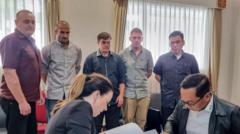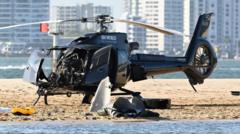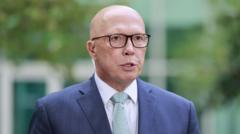The return marks a significant moment in an ongoing discussion about international justice and drug laws.
Australia Welcomes Back Members of Infamous Bali Nine Drug Ring

Australia Welcomes Back Members of Infamous Bali Nine Drug Ring
After nearly two decades in Indonesian prisons, five Bali Nine members return home to Australia.
In a historic development, Prime Minister Anthony Albanese has confirmed the return of five remaining members of the notorious "Bali Nine" drug syndicate to Australia. The men, Matthew Norman, Scott Rush, Martin Stephens, Si Yi Chen, and Michael Czugaj, had served close to 20 years in Indonesian incarceration following their arrest in 2005 for attempting to smuggle heroin.
Albanese expressed his gratitude towards Indonesia's President Prabowo Subianto, thanking him for his compassion in facilitating the repatriation process. The Prime Minister stated he was "pleased to confirm" their return to Australia in a statement released Sunday.
The case itself has had a tumultuous history, resulting in global headlines when two of the group's leaders, Andrew Chan and Myuran Sukumaran, were executed in 2015, sparking a significant diplomatic crisis between Australia and Indonesia. Following the executions, Australia briefly recalled its ambassador to Indonesia, ultimately returning after a five-week hiatus.
Back in 2005, the Bali Nine were apprehended while trying to smuggle approximately 8.3 kg (18 lbs) of heroin from Bali to Australia. Their capture was a direct result of a tip-off from Australian authorities, leading to arrests at both an airport and a hotel.
Besides Chan and Sukumaran, other members faced various sentences; one member, Tan Duc Thanh Nguyen, tragically lost his battle with cancer while in prison in 2018. Renae Lawrence, the only woman in the group, was released in 2018 after serving over a decade behind bars.
In a low-key return, the five men flew from Bali's Ngurah Rai International Airport to Darwin, Australia, aboard Jetstar, without any media presence. Following their return, Indonesian Senior Law Minister Yusril Ihza Mahendra clarified that the men were moved as "prisoners" and upon landing in Australia, fell under the jurisdiction of the Australian government. It should be noted that they received no formal pardon from Indonesian authorities.
The Australian government emphasized the importance of rehabilitation and reintegration, stating that these men would have the opportunity to move forward after their lengthy incarceration. They expressed deep gratitude to Indonesia for allowing the repatriation on humanitarian grounds, despite the gravity of the offenses committed.
Albanese acknowledged the serious nature of the crimes but asserted that it was time for their return after nearly two decades in a foreign prison, reflecting Australia's commitment to maintaining ties with its neighbor amid the complex dynamics of international law.

















